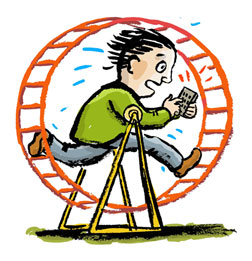Monday, August 31, 2009
Wikichecker
WikiChecker is a tool for analyzing how and by whom articles of en.wikipedia have been edited.
Sunday, August 16, 2009
Beautiful libraries
Justin Menard has compiled a stunning collection of pictures of beautiful libraries, including the Lemuel Gulliver personal library (below)
Crowdsourced gatecrashing
I've blogged previously about Carl Malamud's efforts to make Pacer information freely available by exploiting a free trial to the service to downloading as many court documents as possible and republish them on the web. Ars Technica reports on an interesting project by the The Center for Information Technology Policy that takes a more incremental, automated approach; the Center has developed a Firefox addon, Recap, that captures the information Pacer subscribers view when using the site, and uploads it to a public domain mirror site at the Internet Archive. There's nothing illegal about it (so far), since the fee that Pacer charges is for its value-added (some would say value-deducted) presentation of the information, not the documents themselves, which are public domain. Pacer subscribers using Recap are thus replicating the database at IA, where it will be freely available, and with a much improved interface. Moreover, Recap shows Pacer users when the documents they're looking for already exist, free of charge, in the replicated database. A very interesting and potentially controversial concept, that is being hotly debated at Slashdot.
Wanting to want; more on distraction
Like Nick Carr and many others, David Ulin has discovered lately that he has a hard time finding the focus necessary for reading (this bodes ill for Ulin, who is the LA Times book editor). Instead, he yields to "an odd sort of distraction masquerading as being in the know" and "the sense that there is something out there that merits my attention, when in fact it's mostly just a series of disconnected riffs and fragments that add up to the anxiety of the age."
I know what he's talking about, and am yielding to those very things at this moment. It must be said, however, that I did find the focus necessary to read his article - and lots of other stuff on the web - and am also now in the midst of a fairly focused internal dialogue about how to piece these words together.
Isn't the problem more that I went hunting for that article - or just anything to interest me - in the first place? There's a guilt associated with browsing the net for something to catch one's fancy that does not apply - unfairly, perhaps - when entering the world of a novel and allowing ourselves to be distracted inward. Although Coleridge likened the reading of novels to idly to spitting from a bridge or swinging on a gate (digression: see his contempt for the unwashed readers of novels and "devotees of circulation libraries" below. He sounds like Mark Helprin!) - immersing oneself in a novel is today largely considered a virtuous activity.
Sam Anderson's article in New York Magazine made the point that we, like Skinner's lever-pressing rats, are less attracted to rewards dispensed consistently and predictably than rewards that come to us randomly, according to what is known as the variable ratio schedule, or, as I like to call it, surfing on the internet.
The suggestion, of course, is that seeking, wanting, is an object of desire in itself. Emily Yoffe puts a more scientific spin on this in an article in Slate, and argues that internet surfers, driven forward by that unrelenting slavedriver and neurotransmitter dopamine, are more easily stimulated than satisified. I can buy that, it explains many things. Not just why Ulin and I are surfing instead of reading, but also the shopper's most terrifying experience; discovering that far worse than not finding what you want, is finding nothing to want!
Wednesday, August 12, 2009
Get away from it all
Is Google and the Web grabbing more of your life than you (or your family) are willing to give? Now there's hope...at Opt-Out Village!
Friday, August 7, 2009
Thursday, August 6, 2009
Law Practice Technology Information Sources
From llrx.com, via beSpacific, a useful guide to Law Practice Technology Information Sources
Wednesday, August 5, 2009
Tuesday, August 4, 2009
Legal, Factual and Other Internet Sites for Attorneys and Legal Professionals
A very thorough guide to legal information sources by Timothy Coggins, Associate Dean for Library & Information Services and Professor of Law at the University of Richmond School of Law.
Subscribe to:
Comments (Atom)




